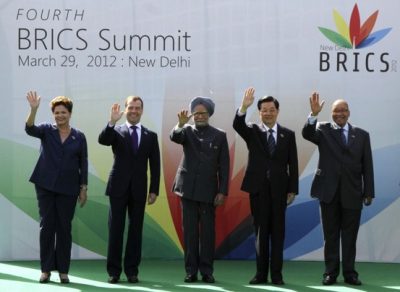BRICS held the view that this would promote adequate burden sharing among IMF creditors.These new contributions are being made in anticipation that all reforms about the redistribution of voting power in the IMF agreed upon in 2010 will be fully implemented in a timely manner.
BRICS were not the only countries to announce contributions to the Fund in the recent G20 summit: Mexico said that it would pledge US$10 billion (the same as Russia, India and Brazil) and many other countries volunteered smaller sums; among them Colombia, South Africa, Indonesia, Malaysia, the Philippines and New Zealand. China, for its part, said it would provide US$43 billion. This came as good news for those convinced that an internationally mandated firewall would help pacify fears spreading across bond markets. Yet the pledges of support were less significant than those who are trying to orchestrate an orderly response to Europe’s self-created troubles had expected.
These commitments merely firm up the numbers already secured in April, bringing the total so-called temporary contributions to the IMF — what IMF Managing Director Christine Lagarde has called a ‘second line of defence’ — to US$456 billion, up from the approximately US$430 billion secured in April. This replenishing of the IMF’s firepower falls short of the initial fundraising goal of US$600 billion, and Indian Prime Minister Manmohan Singh cautioned that even with the additional resources, the firewall may prove inadequate. And the US, caught up in election year tensions, was not a part of the deal.
Of greater importance than whether a financial firewall can work is the continuing push by the world’s new creditors to be heard when issues of global finance are discussed, but there was nothing new to report on this front in the Los Cabos BRIC meeting. The new creditors have been pushing to bring China, Korea, Russia and the other creditors into the heart of the multilateral system, while the countries that have traditionally controlled the IMF ceded some voting shares and representation in 2008 and again in 2010 (which has yet to take effect, as the US Congress has not ratified the agreement). But even when that happens, the advanced economies will still hold 55 per cent of the IMF’s voting power, with EU countries retaining 29 per cent.
As witnessed in the European turmoil, there is little common ground on which creditor and debtor countries can agree. The creditors, as always, want an international monetary system that ensures that they will be repaid with interest in real terms, whatever the numéraire. Regardless of what they may say publicly, debtors would not mind some deterioration in the real value of their debts.
Against that backdrop, the current situation is tense. The past decade has seen an unprecedented change in global financial forces: emerging economies have shifted from being debtors to becoming the dominant creditors in the world economy, and former creditor countries such as the US and Britain are now the leading debtors. The global financial crisis accelerated this trend.
The international monetary system cannot remain dominated by these ‘new’ debtor countries. Given the inherent inflationary bias in this situation, the new creditors will eventually have to impose their conditions if they are to continue to provide financing. This will be more far-reaching than simply raising their representation on the boards of the IMF and the World Bank.
The new creditors do not yet have a shared view for a new global financial order and, even if they were to join forces, they would face considerable opposition from the highly indebted but politically dominant advanced economies. But as financial and economic power continues to migrate East and South, the new creditors will increasingly come to see that reforming existing institutions or creating new ones free from the dominance of debtor countries is in their best joint interest. Without according a much more dominant role — well beyond what was agreed in 2010 — to the new creditors, their efforts to help re-capitalise Western finance are likely to be less forthcoming.
Martin Gilman is Director of the Centre for Advanced Studies at the Higher School of Economics, National Research University, Moscow.

